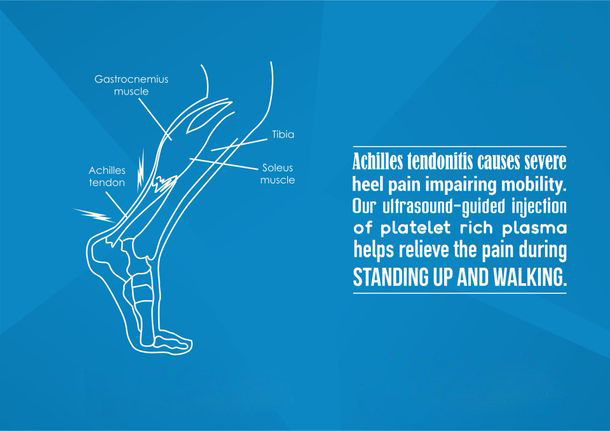

Treatments
HIP, KNEE & ANKLE PAIN

Achilles tendon injection
What is Achilles tendon and why do I need Achilles tendon injection?
The Achilles tendon is a strong fibrous cord that connects the muscles in the back of your calf to your heel bone. It is the strongest tendon in the body. You can feel it as a springy band of tissue at the back of your ankle and above your heel. Achilles tendon injection is indicated in conditions like Achilles Tendinopathy - a painful, swollen, and tender area of the Achilles tendon. Achilles tendinopathy is a common overuse injury causing stiffness in the tendon, which when left unattended can cause rupture of the Achilles tendon. Achilles tendon injection is performed on a day care basis under ultrasound guidance.
How is Achilles tendon injection performed?
At Atlas Pain Care, Coimbatore, you will be asked to change into a hospital gown and taken to our procedure room. Your ankle will be cleaned with antiseptic solution and draped. The injection site is then identified using ultrasound and a small amount of local anaesthetic is injected into the skin overlying the injection site to numb the skin. The medications are then given through a longer needle that has been positioned in the exact spot using ultrasound guidance. You may feel some discomfort during the injection, but this normally settles quickly.
The whole procedure will take around about 15 minutes, and post procedure you will be observed in recovery room for 30 minutes and then discharged home. You may need to rest at home for the remainder of the day. But you should be able to resume your normal activities the next day.
A steroid injection made directly into tendon tissue may weaken it and possibly put it at risk for further damage. For this reason, we perform platelet-rich-plasma injections near the Achilles tendon to stimulate faster tissue healing
What are the risks of the procedure?
As with most procedures, there is a remote risk of bleeding, infection, nerve injury or allergic reaction to the medications used. Injection site pain/soreness is the most common complication that is temporary.
Please read our FAQ section to know more about the do's and don'ts prior to and after the procedure.

